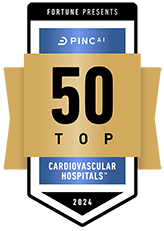Echocardiograms Reveal Extent of Damage
Echocardiograms ("echos") are ultrasound tests that use sound waves to take a moving picture of the heart. An echocardiogram can reveal the size and shape of the heart, its pumping strength, and assess the location and extent of damage to heart tissues. Additionally, an echocardiogram can evaluate the heart for valvular problems such as regurgitation (leaky valve) or stenosis (tight valve that does not open properly).
The Froedtert & the Medial College of Wisconsin Echocardiography Laboratories perform thousands of echo procedures each year. We are accredited by the Intersocietal Accreditation Commission (IAC), a national accreditation agency that requires rigorous standards for performance and interpretation of echocardiograms.
Echocardiogram tests performed in the lab include:
Transthoracic Echocardiogram (TTE)
In this common procedure, an ultrasound transducer that emits sound waves is placed on the chest in the area of the heart. The transducer picks up the echoes of sound waves and transmits them as electrical impulses to a machine that converts the impulses into images of the heart.
Transesophageal Echocardiogram (TEE)
This test is performed with sedation and involves placing a thin tube with an ultrasound probe on the end into the esophagus. The technique places the ultrasound probe closer to the heart and provides greater detail. When needed, our team can also utilize 3D transesophageal echocardiograms to diagnose heart problems.
Intracardiac Echocardiogram (ICE)
This test is conducted during procedures in the heart catheterization and electrophysiology laboratories. The test provides unique ultrasound images from inside the heart.
Echocardiogram Stress Tests (Stress Echo)
A stress echo helps determine how the heart functions under stress. The test can show if the blood supply is reduced in the arteries that supply the heart. This test can also be used to further evaluate diseases of the heart valves or abnormal pressures inside the heart or lungs. Stress tests may be done on a treadmill, a supine bicycle (the patient pedals while lying in bed), or with the use of a medication that stimulates the heart to pump faster, simulating exercise.
3D Echocardiogram
This technique provides a three-dimensional (3D) echo picture of a beating heart. The Echo Lab at Froedtert Hospital has the longest clinical experience in the state using real-time, 3D echocardiography.
Cardiac Resynchronization Therapy (CRT) Evaluation
This procedure uses echocardiography to measure the level of asynchrony (lack of synchronization) in the heart and determine a patient’s eligibility for a specialized pacemaker to correct the problem.
Strain Echocardiogram
This procedure allows physicians to identify the performance of each segment of the heart separately, which gives physicians a much more accurate indication of heart damage caused by cancer therapy or other substances.
Our Cardiovascular Program continues to receive recognition as one of the top programs nationally. We are honored to provide high-quality, effective care for even the most high-risk patients.
-
Check Out Our Heart and Vascular Program Awards and Recognition
In its 2024 Specialty Excellence Awards, Healthgrades recognized Froedtert Hospital as one of America’s 50 Best Hospitals for Cardiac Surgery, one of America’s 100 Best Hospitals for Cardiac Care and one of America’s 100 Best Hospitals for Coronary Intervention, as well as other specialty achievements in various areas.

For the second year in a row, Froedtert Hospital was identified as one of the nation’s 50 Top Cardiovascular Hospitals™ according to an independent quality analysis based on a balanced scorecard provided by PINC AI™, and reported by Fortune. The hospitals recognized in the top 50 operated at lower cost and had better outcomes, recording significantly higher inpatient survival rates, fewer patients with complications, lower readmission rates and up to nearly $10,000 less in total costs per patient case. According to the study’s analysis, if all hospitals operated at the level of this year’s top performers, there could be 7,600 fewer deaths due to heart disease, 6,700 fewer bypass and angioplasty patients who suffer complications, and more than $1 billion in costs saved for the 2024 study year. Froedtert Hospital was ranked in the category of top teaching hospitals with a cardiovascular residency program. In this cohort of hospitals, Froedtert Hospital was ranked No. 4 in the country. No other hospital in Wisconsin was recognized with this national distinction.
The Society for Vascular Surgery's Vascular Quality Initiative (SVS VQI) has awarded Froedtert Hospital three out of three stars for its active participation in the Registry Participation Program. The mission of the SVS VQI is to improve patient safety and the quality of vascular care delivery by providing web-based collection, aggregation and analysis of clinical data submitted in registry format for all patients undergoing specific vascular treatments. The VQI operates 14 vascular registries.
The American Heart Association recognized Froedtert Hospital with its Get With the Guidelines® Heart Failure Gold Plus Award. In addition, the hospital was recognized on the AHA’s Target: Heart Failure(SM) Honor Roll and received the AHA’s Target: Type 2 Diabetes Honor Roll™ award.
The American Heart Association also recognized Froedtert Hospital with its Get With the Guidelines® — Coronary Artery Disease Mission: Lifeline STEMI Receiving Silver Plus and Mission: Lifeline NSTEMI Silver awards. These awards demonstrate our commitment to improving care by adhering to the latest treatment guidelines and streamlining processes to ensure timely and proper care for heart attacks.
The American Heart Association recognized Froedtert Hospital with its Get With the Guidelines® AFib Gold Award.
The Cardiovascular Intensive Care Unit (CVICU) and Neurosurgical Intensive Care Unit (NICU) at Froedtert Hospital have each received a silver-level Beacon Award for Excellence from the American Association of Critical-Care Nurses. This award recognizes unit caregivers who successfully improve patient outcomes and align practices with AACN’s six Healthy Work Environment Standards. Receiving this national three-year award with gold, silver and bronze designations, marks a significant milestone on the path to exceptional patient care and achieving a healthy work environment.





